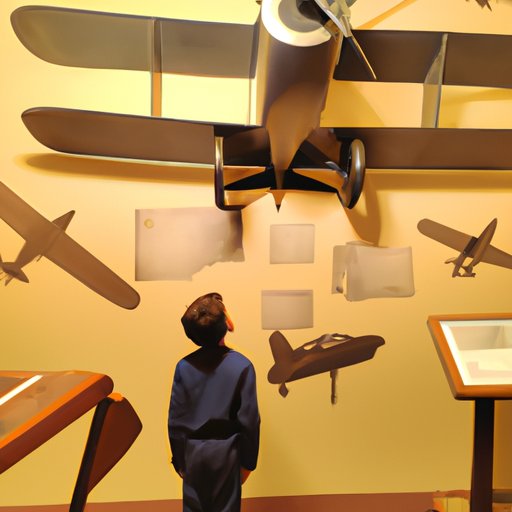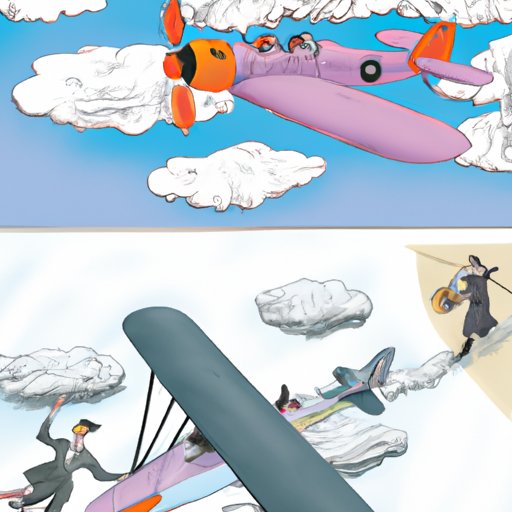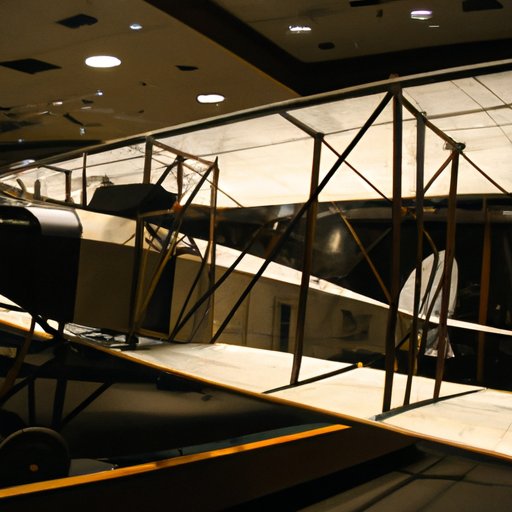Introduction
The aeroplane is one of the most remarkable inventions of modern times. Today, planes are used for transportation, leisure, and even warfare. But who was the inventor of the aeroplane? This article will explore the life and accomplishments of Wilbur and Orville Wright, the inventors of the first aeroplane.
A Historical Account of the Inventor of the Aeroplane
Wilbur and Orville Wright were two brothers from Dayton, Ohio, who are widely credited with being the inventors of the aeroplane. The Wrights were inspired by the work of German engineer Otto Lilienthal, who had been experimenting with gliders since the late 1800s. The brothers initially experimented with kites and gliders before developing a powered aircraft in 1903.
The Wright brothers’ invention was revolutionary because they made several innovations that allowed them to successfully fly a powered aircraft. They developed a system of three-axis control, which enabled the pilot to balance and steer the aircraft. They also developed a lightweight engine, propellers, and wings that could be adjusted in flight. On December 17, 1903, Wilbur and Orville Wright achieved the first successful powered flight at Kitty Hawk, North Carolina.

Exploring the Life and Accomplishments of the Inventor of the Aeroplane
Wilbur and Orville Wright were born in 1867 and 1871, respectively. They were raised in a family of seven children and showed an early interest in mechanics and engineering. Although neither brother attended college, they both studied engineering and developed a deep understanding of the principles of flight.
The Wright brothers’ major achievement was the invention of the aeroplane. Over the course of several years, they conducted extensive experiments and tests, culminating in the first successful powered flight on December 17, 1903. The brothers continued to make improvements to their design, and in 1908 they demonstrated the first fully controllable aircraft. Their accomplishments earned them the title of “the fathers of modern aviation.”
The Wright brothers’ invention changed the way we think about air travel. Their breakthroughs in aircraft design and technology paved the way for airplanes to become a viable form of transportation. Through their research and development, they revolutionized aviation and opened the door for further advances in aircraft technology.

How the Invention of the Aeroplane Changed the World
The invention of the aeroplane had a profound impact on the world. It changed the way wars were fought, as well as the way people traveled and communicated. Here are some of the ways the invention of the aeroplane impacted the world:
Impact on Military Strategy and Technology
The invention of the aeroplane revolutionized military strategy and tactics. Aircraft provided a new way to observe enemy positions and movements, as well as a way to deliver weapons and supplies to troops in the field. The invention of the aeroplane also led to the development of new weapons, such as bombs and missiles, which changed the face of warfare.
Influence on International Trade and Travel
The invention of the aeroplane enabled people to travel faster and farther than ever before. Planes made it possible for goods to be transported quickly and efficiently across large distances, transforming international trade. Additionally, planes made it easier for people to travel to distant places for business or pleasure, opening up a whole new world of possibilities.
Expansion of Global Communications
The invention of the aeroplane had a major impact on global communications. Planes made it possible to deliver mail, packages, and newspapers more quickly and reliably than ever before. With the advent of transatlantic flights, people could communicate with each other in a matter of hours rather than days or weeks.
An Analysis of the Early Designs of the Aeroplane
The Wright brothers’ design was revolutionary, but it was not the only early design of the aeroplane. Other inventors and engineers built upon the Wrights’ work and developed their own aircraft designs. Here is a look at some of the early designs of the aeroplane:
The Wright Brothers’ Design
The Wright brothers’ design was the first successful powered aircraft. It featured a lightweight engine, adjustable wings, and a system of three-axis control. This design allowed the pilot to balance and steer the aircraft while in flight.
Other Early Designs of the Aeroplane
In the years following the Wright brothers’ invention, many other inventors and engineers designed their own aircraft. These designs included monoplanes, biplanes, and triplanes, as well as innovations such as retractable landing gear and enclosed cockpits. Many of these designs were used in World War I and later improved upon.
Advantages and Disadvantages of Early Designs
The early designs of the aeroplane had both advantages and disadvantages. While the Wright brothers’ design was revolutionary, it was limited in terms of speed, range, and maneuverability. Other designs, such as the monoplane and biplane, were faster and had better range, but were more difficult to control. Ultimately, all of these designs contributed to the development of modern aircraft.

Examining the Impact of the Aeroplane on Modern Aviation
Today, the aeroplane has become a staple of modern aviation. It has revolutionized the way we travel and communicate, making it possible to cross vast distances in a matter of hours. Here are some of the ways the aeroplane has impacted modern aviation:
Advances in Aircraft Technology
The invention of the aeroplane led to a number of technological advancements in aircraft design and technology. These advancements include the development of jet engines, advanced navigation systems, and composite materials, all of which have made modern aircraft faster, safer, and more efficient.
Development of Air Traffic Control Systems
The invention of the aeroplane has also led to the development of sophisticated air traffic control systems. These systems monitor air traffic and ensure that planes remain safely separated from each other. Air traffic control systems are essential for ensuring the safe and efficient operation of commercial airlines.
Impact on Commercial and Private Aviation
The invention of the aeroplane has had a major impact on both commercial and private aviation. Airlines can now transport passengers and cargo quickly and safely around the world. Private pilots can also enjoy the freedom of flying, allowing them to explore the world from the sky.
A Comprehensive Overview of the Inventor of the Aeroplane
Wilbur and Orville Wright are widely regarded as the inventors of the aeroplane. Through their pioneering work, they revolutionized aviation and opened the door for further advances in aircraft design and technology. Their accomplishments earned them the title of “the fathers of modern aviation” and their legacy continues to live on today.
Summary of the Inventor’s Life and Accomplishments
Wilbur and Orville Wright were two brothers from Dayton, Ohio, who are widely credited with being the inventors of the aeroplane. Over the course of several years, they conducted extensive experiments and tests, culminating in the first successful powered flight on December 17, 1903. Through their research and development, they revolutionized aviation and opened the door for further advances in aircraft technology.
Impact of the Inventor on Aviation History
The Wright brothers’ invention changed the way we think about air travel. Their breakthroughs in aircraft design and technology paved the way for airplanes to become a viable form of transportation. Through their research and development, they revolutionized aviation and opened the door for further advances in aircraft technology.
Legacy of the Inventor
The legacy of Wilbur and Orville Wright lives on today. Their invention of the aeroplane changed the world, impacting military strategy and technology, international trade and travel, and global communications. Their pioneering work revolutionized aviation and opened the door for further advances in aircraft technology.
Conclusion
The invention of the aeroplane by Wilbur and Orville Wright is one of the most remarkable achievements in modern history. Their groundbreaking work revolutionized aviation and opened the door for further advances in aircraft design and technology. Today, their legacy lives on and their invention continues to shape the world we live in.
(Note: Is this article not meeting your expectations? Do you have knowledge or insights to share? Unlock new opportunities and expand your reach by joining our authors team. Click Registration to join us and share your expertise with our readers.)
